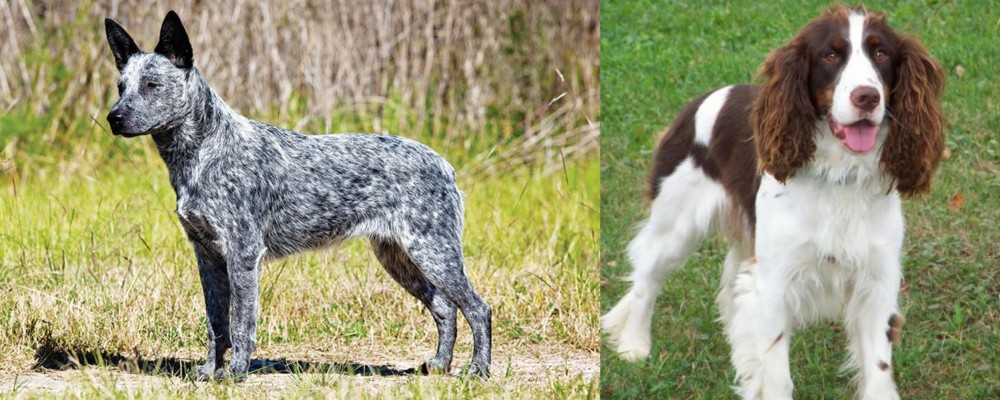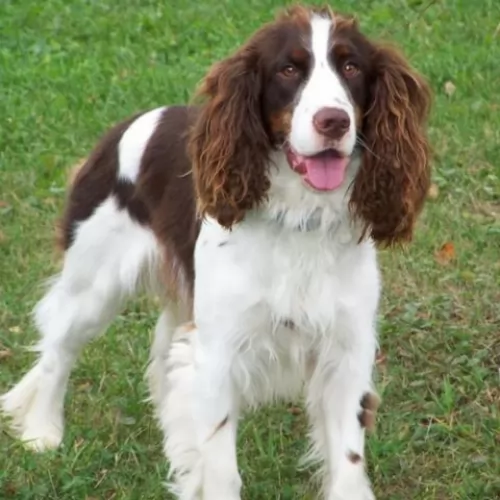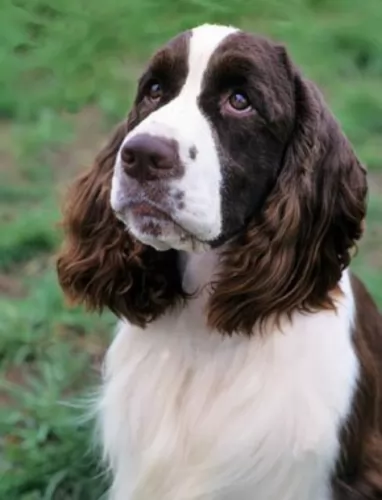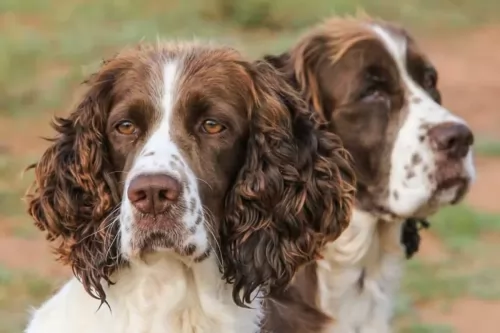 Petzlover
Petzlover Australian Stumpy Tail Cattle Dog is originated from Australia but English Springer Spaniel is originated from United Kingdom. Both Australian Stumpy Tail Cattle Dog and English Springer Spaniel are of same height. Both Australian Stumpy Tail Cattle Dog and English Springer Spaniel are having almost same weight. Both Australian Stumpy Tail Cattle Dog and English Springer Spaniel has almost same life span. Australian Stumpy Tail Cattle Dog may have less litter size than English Springer Spaniel. Australian Stumpy Tail Cattle Dog requires Moderate Maintenance. But English Springer Spaniel requires Low Maintenance
Australian Stumpy Tail Cattle Dog is originated from Australia but English Springer Spaniel is originated from United Kingdom. Both Australian Stumpy Tail Cattle Dog and English Springer Spaniel are of same height. Both Australian Stumpy Tail Cattle Dog and English Springer Spaniel are having almost same weight. Both Australian Stumpy Tail Cattle Dog and English Springer Spaniel has almost same life span. Australian Stumpy Tail Cattle Dog may have less litter size than English Springer Spaniel. Australian Stumpy Tail Cattle Dog requires Moderate Maintenance. But English Springer Spaniel requires Low Maintenance
 There is quite a bit of mystery surrounding the origin of the Stumpy Tail Cattle Dog. The breed was developed as a working dog to herd sheep and cattle, but there are quite a few theories about the development of the breed. It is agreed however, that the dog was developed in Australia and came about from crossing the Australian Dingo and British herding dogs.
There is quite a bit of mystery surrounding the origin of the Stumpy Tail Cattle Dog. The breed was developed as a working dog to herd sheep and cattle, but there are quite a few theories about the development of the breed. It is agreed however, that the dog was developed in Australia and came about from crossing the Australian Dingo and British herding dogs.
Perhaps the most popular theory for the origin of the Australian Stumpy Tail Cattle Dog is that the breed was developed by a man named Timmins, sheep drover and a cattle operating in New South Wales during the colonial period. Whatever the dog’s origins, it was in 1996 that the United Kennel Club, the 2nd largest dog registry in the world and the United States, granted full recognition to the Stumpy Tail Cattle Dog as a member of the Herding Group. The breed’s name was changed to the Australian Stumpy Tail Cattle Dog in 2002. Today he remains almost exclusively a tail-less working dog.
 The English Springer Spaniel is one of many gun dog breeds that flush and retrieve. They descended from the Shropshire Spaniels and Norfolk Spaniels. The English Springer Spaniel is somewhat similar to the Welsh Springer Spaniel and believe it or not they are also closely related to the English Cocker Spaniel. In the last century the cockers and springers came from the same parents. The larger dogs flushed game and made game “spring” from the brush while the smaller dogs – the “cockers” would hunt woodcock. Eventually through specific breeding, the UKC of England recognized the “springers” as a separate breed.
The English Springer Spaniel is one of many gun dog breeds that flush and retrieve. They descended from the Shropshire Spaniels and Norfolk Spaniels. The English Springer Spaniel is somewhat similar to the Welsh Springer Spaniel and believe it or not they are also closely related to the English Cocker Spaniel. In the last century the cockers and springers came from the same parents. The larger dogs flushed game and made game “spring” from the brush while the smaller dogs – the “cockers” would hunt woodcock. Eventually through specific breeding, the UKC of England recognized the “springers” as a separate breed.
Sydenham Edwards, in 1801, proposed that the spaniels be divided into the Springing or Hawking Spaniel and the Cocking or Cocker Spaniel. From this point on there was a flourish in the development of spaniel breeds in the 19th century. They were usually named for the county in which they were founded or after the individual who developed them. In 1902, the English Springer Spaniel was officially recognized as its own breed by the UKC. It was not until 1910 that the AKC recognized them as well.
 An interesting fact about the Australian Stumpy Tail Cattle Dog is that he is naturally tail-less so no tail docking has been required for this naturally bobtailed dog. He is medium-sized to large-sized with his most distinctive feature being the lack of a tail. The coat of the dog is short to medium length, dense and straight. Another interesting aspect is that the coat color is a speckled blue or speckled red.
An interesting fact about the Australian Stumpy Tail Cattle Dog is that he is naturally tail-less so no tail docking has been required for this naturally bobtailed dog. He is medium-sized to large-sized with his most distinctive feature being the lack of a tail. The coat of the dog is short to medium length, dense and straight. Another interesting aspect is that the coat color is a speckled blue or speckled red.
Height of the dog is 46–51 centimetres at the withers the dog is normally squarely proportioned with long legs and pricked ears. The dog has no exaggerated features and what you see is what you get – a plain, hard-working dog which is fit and muscular. He is equally long from chest to rump as he is from the ground to the shoulder.
The muzzle of the dog is of average length, but fairly broad and the nose is always black. The dog is intelligent, alert and also mischievous and he makes a good pet. With proper socialization, he’ll get on well with children they know and who treat them with kindness. He is alert and makes a very good watchdog, being fairly territorial.
 Among spaniels the English Springer is medium size and well compacted. Both the working dog and the show dog sport moderately long coats and a friendly tail. They both wear a gentle expression in their eyes. But there the commonality stops as the difference between the working English Springer Spaniel and the show line is greater in this breed than in any other. The gene pools have become almost separate over the last 70 years. If you put a field dog in the show ring they would not be able to compete. If you put a show line English Springer in the field, they would not have the stamina or speed for field trials.
Among spaniels the English Springer is medium size and well compacted. Both the working dog and the show dog sport moderately long coats and a friendly tail. They both wear a gentle expression in their eyes. But there the commonality stops as the difference between the working English Springer Spaniel and the show line is greater in this breed than in any other. The gene pools have become almost separate over the last 70 years. If you put a field dog in the show ring they would not be able to compete. If you put a show line English Springer in the field, they would not have the stamina or speed for field trials.
The field line has a coarser coat and less pendulous ears. They may dock a few inches off the tail, and they are much scruffier than the show dogs. On the other hand, the show dogs have dewlaps, pendant ears and dangling flews. They are heavier and thicker than the field dog. They have long muzzles, not so prominent eyes and docked tails. The English Springer Spaniel stands tall and proud, coming from an ancient line of Spaniels
 The Australian Stumpy Tail Cattle Dog is a hardy dog, capable of hardships that would take its toll on other dog breeds. He is a wonderful athlete and if you’ve got him working with your livestock, he’ll tirelessly perform his duties – small wonder he is so valued in the Australian cattle industry.
The Australian Stumpy Tail Cattle Dog is a hardy dog, capable of hardships that would take its toll on other dog breeds. He is a wonderful athlete and if you’ve got him working with your livestock, he’ll tirelessly perform his duties – small wonder he is so valued in the Australian cattle industry.
If you’re looking for a robust breed who will have all the energy needed to accompany you on all your adventures, he won’t disappoint. He is amazingly capable and always willing.
He’s a family dog and will be loving, devoted and loyal. Care should be taken with him around small children and other pets as he’s not to comfortable around them and he doesn’t tolerate strangers too well either. Train him and socialize him and you’ll have an amazing friend for life.
 The English Springer Spaniel is a friendly dog who loves to please his people. They are great family dogs, easy-going and affectionate. In addition, they are attentive and alert which makes them such great hunting dogs. With exceptional speed and stamina, he needs activity to stimulate his body and brain. He is very intelligent. That intelligence can lead to stubbornness as well. He’d great with kids and good with other pets with perhaps the exception of cats. The breed is in love with water and will get in at any time.
The English Springer Spaniel is a friendly dog who loves to please his people. They are great family dogs, easy-going and affectionate. In addition, they are attentive and alert which makes them such great hunting dogs. With exceptional speed and stamina, he needs activity to stimulate his body and brain. He is very intelligent. That intelligence can lead to stubbornness as well. He’d great with kids and good with other pets with perhaps the exception of cats. The breed is in love with water and will get in at any time.
 The Australian Stumpy Tail Cattle Dog is regarded as being an extremely healthy breed, and the average life expectancy of this breed is at least 14 to 15 years and older.
The Australian Stumpy Tail Cattle Dog is regarded as being an extremely healthy breed, and the average life expectancy of this breed is at least 14 to 15 years and older.
They don’t suffer with many genetically inherited conditions, but they are susceptible to
 Not an uncommon issue for most medium to smaller sized dogs. It can lead to lameness or arthritis.
Not an uncommon issue for most medium to smaller sized dogs. It can lead to lameness or arthritis.
Loss of vision due to a deterioration of the retina.
Clubs form in the retinal tissue and can lead to blindness.
The twisting or distention of the stomach that effects dogs with deep chests and can lead to death if not treated immediately.
 The beauty about the Australian Stumpy Tail Cattle Dog is that he is low to moderate maintenance. He will require a good weekly brushing as he can shed quite a bit when the season’s change and his new coat comes in. He is hypoallergenic.
The beauty about the Australian Stumpy Tail Cattle Dog is that he is low to moderate maintenance. He will require a good weekly brushing as he can shed quite a bit when the season’s change and his new coat comes in. He is hypoallergenic.
Australian Stumpy Tail Cattle Dog puppies will need 4 bowls of food over a 24 hour period Puppies from 6 months on can have 2 bowls a day. Speak to your vet about the best foods for your dog and ensure fresh, cool water is constantly available to your pet.
Don’t just feed your dog pellets continuously – mix in some raw meat and some cooked chicken and rice for variety and to ensure a shiny, glossy coat.
The Stumpy is a hugely energetic dog and he will become bored and frustrated if he doesn’t get plenty of exercise and games. Ball throwing, swimming, long walks and a run in the park will be important for the Stumpy that doesn’t live on a farm. Leaving him alone without exercise will lead to anti-social behaviour such as continuous barking, digging and chewing.
Take your Stumpy to the vet if you suspect health problems. Certainly, when you buy a puppy, make sure that he has all his vaccinations. There are certain health problems that are more common in the Australian Cattle dog and you want to do whatever it takes to ensure your dog steers clear of them.
 The English Springer Spaniel can gain weight easily and obesity is one of the biggest health issues for this breed. Feed them a high quality dry dog food. Working dogs need more energy and more calories than the inactive dog. An active member of the breed should have around 1353 calories every day in at least 2 meals if not 3. Do not feed a large meal before or after strenuous exercise as this can cause bloat.
The English Springer Spaniel can gain weight easily and obesity is one of the biggest health issues for this breed. Feed them a high quality dry dog food. Working dogs need more energy and more calories than the inactive dog. An active member of the breed should have around 1353 calories every day in at least 2 meals if not 3. Do not feed a large meal before or after strenuous exercise as this can cause bloat.
In addition to the health issues listed above the English Springer Spaniel is also prone to:
This is a genetic condition where the body cannot use the carbohydrates it takes in and convert it to energy. This is identified as a blood disorder.
Causes seizures but can be treated with medications.
With longer , droopy ears, infection is always a possibility. Clean them regularly and keep them dry.
The working English Springer Spaniel is a very energetic dog requiring daily exercise and loving to play. They love walks and hikes. They can excel in competitions such as rally, agility, tracking, field and obedience.